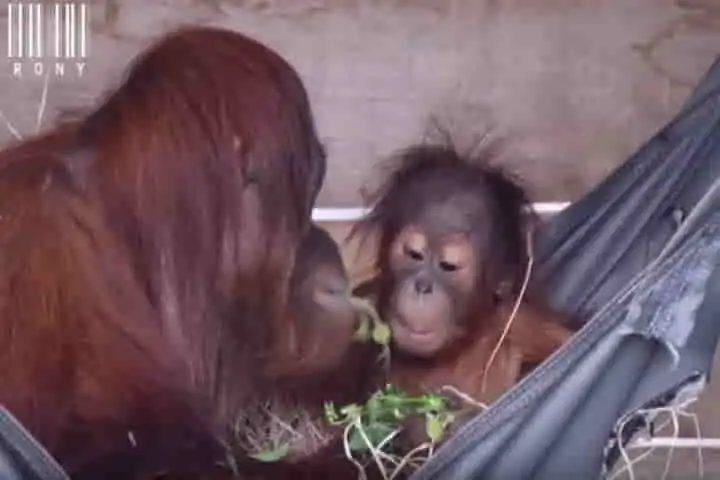

Representational image. A study of Sumatran orangutan mothers has revealed that even though they are good to their offspring, discipline is enforced when required (Pic. Courtesy Twitter/@SimamoraDupito)
<p>
<strong>Parenting is tough be it humans or animals but when it comes to the latter, they know when and where to draw the line. That is what a new study published in Scientific Reports states according to an article in nytimes.com.</strong></p>
<p>
Studying 21 juvenile orangutans residing with their mothers in the forest of Sumatra located in the west coast of Aceh Province, the scientists studied and documented 1,390 incidents of the young ones asking food from their mothers by just grabbing it which was permitted but only up to a limit.</p>
<p>
Just like human children, orangutan young ones are lovable, endearing and amiable but they differ in one crucial aspect as they do not throw tantrums or show temper when refused anything by their mother.</p>
<p>
Right from the beginning, the mama primate teaches the young to forage for food all the while keeping in mind the age of the offspring and how complex the food-gathering process is.</p>
<p>
Talking about the study, David P. Watts, Yale&rsquo;s Professor of Anthropology, who has written widely on behaviour of primates said: <a href="https://www.nytimes.com/2021/12/17/science/orangutan-foraging.html">&ldquo;No one has done much work on this,</a> and no one had data like this for Sumatran orangutans. The whole topic of how young primates learn what they need to eat &mdash; people haven&rsquo;t studied it very much.&rdquo;</p>
<p>
Incidentally, Watts was not part of the research team.</p>
<p>
The bonding of the young orangutans with their mater is for long &ndash; eight to nine years &ndash; longer for any mammal except human and this time is well utilised as they are taught to identify, collect and process food items running to more than 200 in number.</p>
<p>
While flowers and leaves are the easy pick and instant food, fruits which are a substantial part of their diet are tough as it is vital to know when they are ripe, realise which portions can be eaten and how to draw them out.</p>
<p>
Then of course there are foods which require the use of tools like retrieving honey from a beehive which necessitates the choice of the right stick and long practice on how to use it.</p>
<p>
<strong>Also read: <a href="https://www.indianarrative.com/science-news/albatross-couples-could-be-separated-by-climate-change-130779.html">Albatross couples could be separated by Climate Change</a></strong></p>
<p>
By the time the young animal is eight years old it has mastered the basics of how to feed itself and by 12 it has acquired knowledge about complex food finding and preparing methods.</p>
<p>
During the study the scientists discovered that when the food was easy to get and prepare and the offspring seeking it older, there were lesser chance of the mother sharing it. The mama orangutan allowed the younger lot to take food, making that concession even for her older children, provided the food was hard to get. In contrast if the grown-up child demanded say flowers, which are accessible, she didn&rsquo;t give it &ndash; driving home the message that it is something that they can do it on their own.</p>
<p>
Mothers are large-hearted as is evident from the fact that they were willing to give food to children of any age group which was best and tough to obtain like meat of squirrels, civets or small primates.</p>
<p>
Another outstanding feature of these creatures is that the mamas are patient while the children are pliant and amenable. This is evident in situations when the mother not wanting to give food simply moves away or stations herself where the youngster can&rsquo;t reach her. There is no display of anger, yet the message gets conveyed.</p>
<p>
<strong>Also read: <a href="https://www.indianarrative.com/science-news/when-a-dog-responds-to-your-voice-by-tilting-its-head-it-means-it-is-paying-attention-to-you-says-a-new-study-129458.html">When a dog responds to your voice by tilting its head, it means it is paying attention to you, says a new study</a></strong></p>
<p>
The study&rsquo;s lead author, Caroline Schuppli observed: &ldquo;We know that people and orangutans have role models who adjust their behaviour according to the needs of the pupil. In humans, adults do this proactively; in orangs, the initiative comes from the kid &mdash; they need to ask for the food.&rdquo;</p>
<p>
Expressing his views about this study, research group leader at the Max Planck Institute of Animal Behaviour in Konstanz, Germany, Dr. Schuppli said children of human beings have teachers in constant attendance as besides the parents, there members of the extended family and also educational system based on active teaching. &ldquo;If you think about what a kid needs to learn &mdash; it&rsquo;s well beyond their imagination, beyond what they could actively ask for. But with orangutans it&rsquo;s quite a bit simpler.&rdquo;</p>
New Zealand's Deputy Prime Minister and Foreign Minister Winston Peters has arrived Kathmandu on his…
The Indian Army and the Mongolian Armed Forces will commence the 17th edition of their…
Pandi Ram Mandavi, a renowned artist from Bastar, Chhattisgarh, was conferred the Padma Shri award…
Taiwan's Mainland Affairs Council (MAC) criticised China on Wednesday for organising two summits for Taiwanese…
The East Turkistan Government in Exile (ETGE) vehemently denounces Mr. Francesco Frangialli, the Honorary Secretary-General…
Chairman John Moolenaar and Ranking Member Raja Krishnamoorthi of the House Select Committee on the…